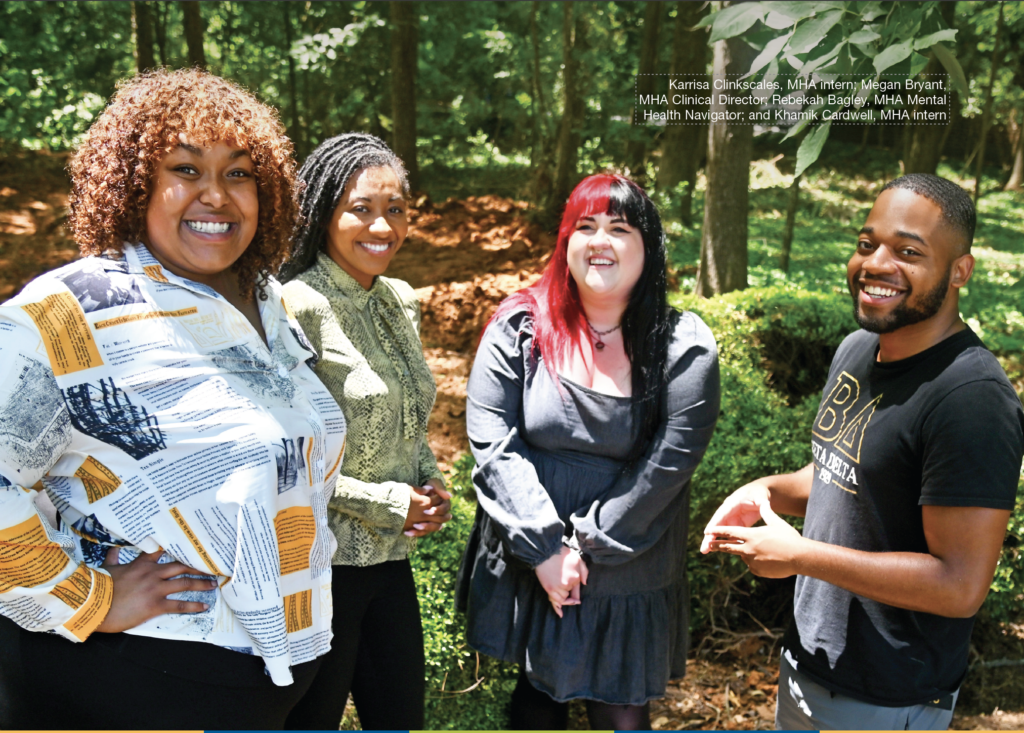By Brenda Porter-Rockwell
Walk into the office suite on Charlotte’s Latrobe Drive and you’re greeted with large windows, comfy seating and soothing wall colors. While this could be the setup for any business, Mental Health America of Central Carolinas (MHA) wants visitors to feel like they’re being enveloped in a caring and welcoming environment to deal with mental health matters.

For MHA, every detail of their two-part mental health awareness plan — which includes a new, free in-person counseling center and an all-digital marketing campaign — needs to remind those who are struggling that mental health care matters and help is just around the corner.
Putting the pieces together
After working in a nearly empty office for much of the pandemic, two things became clear for Kathy Rogers, executive director of MHA: Hybrid and remote work would become the norm and, more than ever, improved access to mental health treatment is a needed resource. But what to do about those two realities — how to honor staff working preferences, yet make use of office space they own but are not fully utilizing?
“We always want to make sure we’re using all our assets to serve the community. So, we put together a small group of folks to begin helping us conceptualize what a counseling center could look like … and how could we make it free to those who cannot afford to pay for counseling,” explained Rogers.
Thanks to a $1.25 million grant from Mecklenburg County’s American Rescue Plan Act (ARPA) funding, the Latrobe Drive office space was renovated and turned into a free counseling center in January 2023. Again, with a focus on efficiency and community commitment, some of the funds were allocated to hiring a clinical director and to providing a stipend for graduate school interns from Johnson C. Smith University and the University of North Carolina at Charlotte who would work in the counseling center.
“We know that the pandemic disproportionately impacted the mental health of communities of color, and the counseling center is designed to address these disparities,” said Rogers.
According to Mental Health America, the parent organization for Mental Health America of Central Carolinas, 7 million African Americans and another 10 million Latinos suffer from mental illness. The center is meant to be a welcoming, safe space for short-term, no-cost counseling services.
“I feel like when they walk through the door of our counseling center, they are getting a kind of warm hug,” said MHA’s Development Director, Andrea Towner.
Megan Bryan, MHA’s Counseling Center Clinical Director, said 80 percent of clients seen in the counseling center are either uninsured or underinsured; and within that population, 75 percent are people of color.
“What I’ve found in the years in this field is that [clients] want someone who looks like them. They want someone who gets it — not just the textbook version — but actually [someone] who understands some of the things that they’re saying,” said Bryan.
The clinical staff recognizes that underlying issues like homelessness or food insecurity may be the root cause of a mental health crisis. MHA has partnered with other nonprofits where they can refer clients for additional support. Otherwise, said Towner, “It’s going to be difficult to deal with their mental health.”
The center will also be a resource for increasing the pipeline of trauma-informed clinicians of color. Under Bryan’s supervision, MHA will welcome its second cohort of interns in August. Working in the counseling center and gaining access to additional community organizations, or what Bryan calls “wrap-around resources,” offers the graduate students’ broader connections and resources they may be able to utilize later in a professional setting.
My mental health matters
MHA reaches across Mecklenburg and Cabarrus counties for in-person mental health counseling support. To connect with a broader audience, some ARPA funds cover a new Caring for Communities of Color campaign called “My Mental Health Matters.”
In partnership with local organizations like Charlotte Pride, a leader in LGBTQ visibility in Charlotte and the Carolinas, the “My Mental Health Matters” campaign aims to help end the stigma around addressing mental health, especially in Black and Brown communities. “We are making that impact by this push for this campaign in communities of color,” said Bryan.
The campaign features a landing page (https://mhaofcc.org/caring-for-communities-of-color) with well-known Black and Brown faces like former professional football player Steve Smith Sr., as well as radio ads and billboards targeting specific communities in English and Spanish languages. There is also an online survey, whose results can help MHA better identify some of the barriers people face when seeking treatment.
“We really want people to feel comfortable — as comfortable getting therapy as they are getting their blood pressure medication, or whatever they need to live a healthy life,” Bryan said. He added, “We’re going to continue to focus on how we reach those communities of color and get people to develop trust in addressing their mental health.”
The website offers ways to book in-person and virtual appointments in the counseling center as well as educational resources around mental health and inspirational “We See You” videos of real-life individuals sharing stories about why “Mental Health Matters.” There are also links to in-person events for coffee and conversations around increasing understanding and mental health awareness and breaking the stigma of seeking help when needed. “I see a wonderful bright future for MHA and the work that we’re doing,” said Rogers.
Call 704-365-3454 for more information on Mental Health America of Central Carolinas.

